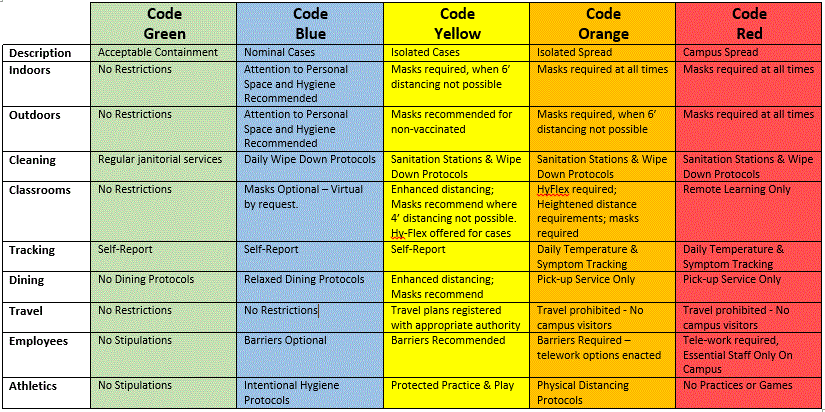2023-2024 Academic Year Cases
2 Active Cases [Last Updated – November 17, 2023]

COVID Protocols – Updated Fall 2023
According to a recent study, researchers are suggesting that COVID-19 will likely cultivate into a regular rhythm, with transmission spiking during certain seasons, much like influenza. It is suggested that the endemic nature of the virus may be most active during the colder months of fall and winter, subsiding in summer. While endemic viruses may be more predictable, they can still cause a range of symptoms, including hospitalization and even mortality.
College staff will continue to monitor conditions and will take necessary precautions. In addition, all members of the Campus Community are encouraged to remain vigilant. Symptoms may differ from person to person. Therefore, knowing your level of risk, becoming familiar with the symptoms, and taking personal protection and precautions are important.
Flexibility will be required of the entire campus community as the College continuously evaluates its position in light of COVID-19 in and about the community. In alignment with our focus on character, we are asking that we demonstrate respect and forbearance for one another.
Currently, masks and vaccines are optional.
When to Test
Members of the campus community who develop symptoms related to COVID-19 should get tested as soon as possible. Most often, COVID-19 presents upper and/or lower respiratory symptoms, and it is often difficult to distinguish between COVID-19 and seasonal influenza.
Keep in mind, that it may take up to three (3) days before a person may test positive, as a certain amount of “viral load” may be needed before antigen testing is effective Therefore, individuals should not assume that they are COVID-free even if a test is negative within the first few days of getting symptoms. Test again in the next few days.
Testing kits are available at a number of local pharmacies and the McPherson Center for Health.
Positive – What’s Next?
Students who have tested positive for COVID are to Contact their Resident Director or Office of Student Life. Students will be asked to meet with a member of the telehealth team in order to determine a prognosis, which will be used to determine isolation protocols.
Students who are not able to make other arrangements will be asked to isolate in their assigned residential space, provided they follow the protocols noted below. Failure to adhere to these protocols will result in the student, at his or her own expense, being relocated to a local hotel for the remainder of their isolation period.
Per current CDC guidelines, individuals who test positive should isolate themselves from day 0 to day 5. On days 6-10, individuals may return to their communities while wearing a well-fitting mask as long as they are fever-free for 24 hours without the use of fever-reducing medications. Telehealth services will provide a suggested timeline, which you will be asked to share with the Office of Student Life so that they can identify the services needed.
In-Room Isolation Instructions
If a student is instructed to isolate in his or her assigned residence space, the following protocols should be followed:
- The isolating individual must remain in his or her room except to use the restroom/shower facilities, wash clothing, or seek medical services.
- Meal delivery should be arranged with the Resident Director or Office of Student Life
- The isolating individual must wear a mask when around others in their room and at all times outside of the room.
- The isolating individual is not permitted to visit or loiter in public space, and is not permitted to have guests in the room or have sustained interactions with others
All students are to follow CDC, telehealth, and medical guidance for the entire isolation period. Students will not be reimbursed for tuition, room, board, or other fees due to isolation due to a student’s choice to return home or make off-campus isolation arrangements.
Roommates of Students Who Test Positive for COVID
The College has limited alternative housing. These spaces are reserved for those who have tested positive and have been counseled by telehealth services or a physician to seek significant levels of isolation. In some cases, there may not be enough alternative options, meaning that a roommate may be positive and have to isolate in his or her assigned residential space. Given that a roommate has tested positive, exposure has already likely happened to any other roommate sharing the same space. As such, roommates should plan to continue to live in their assigned residence space.
Students with a documented underlying medical condition or risk factor that is considered to be high risk for severe illness should make their needs known to a Resident Director or the Office of Student Life. The College will do its best to identify a possible alternative rooming arrangement, which may require an assignment with a temporary roommate.
Students are to follow CDC guidance for those who have been exposed to COVID.
Academic Work
Upon receiving verification and prognosis from a telehealth representative, the Office of Student Life will alert the Academic Office, providing an isolation timeline. The Academic Office will alert instructional staff. However, students are responsible for contacting each of their professors about materials and assignments that will be missed. Professors should coordinate with students to ensure that any materials or assignments missed during isolation are provided in the most timely and effective manner possible. When appropriate and effective, professors are encouraged to facilitate real-time participation via ZOOM or equivalent methods.
At the end of the isolation period, students will need to verify that they have been fever-free for at least 24 hours. If so, the Student Life Office will release them from isolation. Students released from isolation are required to wear a mask for an additional five (5) days following the isolation period.
Questions should be directed to the Office of Student Life
COVID Resources
Expenditure Reports
- Quarterly Budget and Expenditure Reporting (All HEERF I, II, & III Grant Funds): 12-31-2022 Final Report
- Quarterly Budget and Expenditure Reporting (All HEERF I, II, & III Grant Funds): 09-30-2022
- Quarterly Budget and Expenditure Reporting (All HEERF I, II, & III Grant Funds): 06-30-2022
- Quarterly Budget and Expenditure Reporting (HEERF I, II, & III): 03-31-2022
- Quarterly Budget and Expenditure Reporting (HEERF I, II, & III): 12-31-2021
- Quarterly Budget and Expenditure Reporting (HEERF I, II, & III): 09-30-2021
- Quarterly Budget and Expenditure Reporting: 6-30-2021
- Quarterly Budget & Expenditure Reporting (CARES Act): December 31, 2020 – Final Report
- Quarterly Budget and Expenditure Reporting (CARES Act): October 30, 2020
CCCK Major Updates & Information
HEERF III – ARP Emergency Grants
The American Rescue Plan (ARP), was signed into law on March 11, 2021. ARP provides the U.S. Department of Education (DOE) funds to distribute to institutions of higher education in order to prevent, prepare for, and respond to coronavirus through a third round of Higher Education Emergency Relief Funds (HEERF III). Institutions accepting ARP funding must commit to providing a portion of the funds in the form of financial aid grants to students.
Central Christian College of Kansas’ minimum required allocation to students is $862,622.
The grant funds will focus on those students showing exceptional need who have struggled to meet expenses due to COVID-19. Eligible expenses include:
- tuition
- food
- housing
- course materials
- technology
- health care
- childcare
In accordance with guidance from the DOE on the distribution of these funds, students have the option of applying the funds directly to their student account balance. A form will be distributed to all eligible students, which will allow them to select for funds to go directly to their student account balance or in the form of a check. HEERF III funds now allow eligibility to all students including undocumented, Deferred Action for Childhood Arrivals (DACA), and international students. Unused funds from HEERF II emergency student grants will be rolled into HEERF III for distribution.
Communication to assist in educating students of this opportunity is being sent via emails, website presence, campus groups and the financial aid office.
HEERF II – CRRSAA Emergency Grants
HEERF II – CRRSAA Emergency Grants
The Coronavirus Response and Relief Supplemental Appropriations Act, 2021 (CRRSAA), was signed into law on December 27, 2020. CRRSAA provides the U.S. Department of Education (DOE) funds to distribute to institutions of higher education in order to prevent, prepare for, and respond to coronavirus through a second round of Higher Education Emergency Relief Funds (HEERF II). Institutions accepting CRRSAA funding must commit to providing a portion of the funds in the form of financial aid grants to students.
Central Christian College of Kansas’ minimum required allocation to students is $232,492.
The grant funds will be distributed to both residential and online students with top priority being shown to those students with exceptional need who have struggled to meet expenses due to COVID-19. Eligible expenses include:
- tuition
- food
- housing
- course materials
- technology
- health care
- childcare
Students who are Pell eligible will receive priority and a higher level of funds than those that are non-Pell eligible. A student is not required to be Pell eligible in order to receive the grant. Students who are eligible will receive a minimum amount of $500 up to a maximum amount of $1,000.
In accordance with guidance from the DOE on the distribution of these funds, students have the option of applying the funds directly to their student account balance. A form was distributed through email to all eligible students which allowed the option to receive the funds through check or being applied to student account balance first with remaining funds through a check. Written authorization through this form use was required to apply the funds directly to a student account balance.
Communications via emails, website presence, and campus groups, assisted in educating students of this opportunity.
At the time of distribution, the U.S. Department of Education had yet to issue guidance on the question of whether undocumented, Deferred Action for Childhood Arrivals (DACA), or international students would qualify for HEERF II grant awards. Therefore, Central Christian College of Kansas did not issue grant funds to these students.
CARES ACT UPDATE- Oct. 30, 2020
COVID Funding Update (CARES Act – HEERF)
In an effort to assist students affected by the COVID-19 crises, the Federal Government approved the $2 trillion CARES Act, a part of which established the Higher Education Emergency Relief Fund. This fund provides institutions, like Central Christian College of Kansas, a specified amount of funds earmarked to be used as emergency financial aid grants to qualified residential students for expenses incurred due to the disruption of campus operations this spring. Upon signing and returning the Certification and Agreement, Central Christian College was initially awarded $464,984. Of this amount, $232,492.00 was distributed directly to qualified residential students.
According to federal regulations, Title IV eligible students, who were enrolled in the residential program as of March 13th, 2020, as degree-seeking students, were eligible to receive a portion of this aid. All funds were forwarded to eligible students. Any debts or fees owed to the College were not deducted from the emergency grant. These are federally funded, one-time grants, and do not require any repayment, nor are they taxable to the students receiving the funds.
Using data from the FASFA, the College developed a formula to ensure an equitable distribution of these funds, which considered the universal reality that all students suffered some level of disruption, as well as the economic reality that a number of students face additional economic need, as documented on the FAFSA. All eligible students will receive a minimum of $700 to help offset costs. The remaining pool of funds was apportioned based on a calculated relationship between Cost of Attendance (COA) and Expected Family Contribution (EFC), which could result in an additional distribution of $5 to $550.
The College has determined that 216 students qualified for some level of aid, ranging from $700 – $2,196. To date [10/30/2020], the College has disbursed $232,492 to 225 students, using up the total amount allocated for this fund.
As required by Federal Regulations, the following report provides an analysis of how the institutional portion has been used by the College: Quarterly Budget and Expenditure Reporting (CARES Act).
October 30, 2020 - CARES ACT Update
COVID Funding Update (CARES Act – HEERF)
In an effort to assist students affected by the COVID-19 crises, the Federal Government approved the $2 trillion CARES Act, a part of which established the Higher Education Emergency Relief Fund. This fund provides institutions, like Central Christian College of Kansas, a specified amount of funds earmarked to be used as emergency financial aid grants to qualified residential students for expenses incurred due to the disruption of campus operations this spring. Upon signing and returning the Certification and Agreement, Central Christian College was initially awarded $464,984. Of this amount, $232,492.00 was distributed directly to qualified residential students.
According to federal regulations, Title IV eligible students, who were enrolled in the residential program as of March 13th, 2020, as degree-seeking students, were eligible to receive a portion of this aid. All funds were forwarded to eligible students. Any debts or fees owed to the College were not deducted from the emergency grant. These are federally funded, one-time grants, and do not require any repayment, nor are they taxable to the students receiving the funds.
Using data from the FASFA, the College developed a formula to ensure an equitable distribution of these funds, which considered the universal reality that all students suffered some level of disruption, as well as the economic reality that a number of students face additional economic need, as documented on the FAFSA. All eligible students will receive a minimum of $700 to help offset costs. The remaining pool of funds was apportioned based on a calculated relationship between Cost of Attendance (COA) and Expected Family Contribution (EFC), which could result in an additional distribution of $5 to $550.
The College has determined that 221 students qualified for some level of aid, ranging from $700 – $1,249. To date [10/30/2020], the College has disbursed $232,492 to 227 students, using up the total amount allocated for this fund.
As required by Federal Regulations, the following report provides an analysis of how the institutional portion has been used by the College: Quarterly Budget and Expenditure Reporting (CARES Act).
August 14, 2020 - CARES ACT Update
In an effort to assist students affected by the COVID-19 crises, the Federal Government approved the $2 trillion CARES Act, a part of which established the Higher Education Emergency Relief fund. This fund provides institutions, like Central Christian College of Kansas, a specified amount of funds earmarked to be used as emergency financial aid grants to qualified residential students for expenses incurred due to the disruption of campus operations this spring.Upon signing and returning the Certification and Agreement, Central Christian College was initially awarded $464,984. Of this amount, no less than 50% ($232,492.00) will be distributed directly to qualified residential students.
According to federal regulations, Title IV eligible students, who were enrolled in the residential program as of March 13th, 2020, as degree-seeking students, were eligible to receive a portion of this aid. All funds are being forwarded to eligible students. Any debts or fees owed to the College will not be deducted from the emergency grant.
These funds were provided to help students with costs associated with having to relocate following Spring Break (e.g. food, housing, technology, health-care, transportation, relocation expenses, etc). These are federally funded, one-time grants, and do not require any repayment, nor are they taxable to the students receiving the funds.
Using data from the FASFA, the College developed a formula to ensure an equitable distribution of these funds, which considered the universal reality that all students suffered some level of disruption, as well as the economic reality that a number of students face additional economic need, as documented on the FAFSA. All eligible students will receive a minimum of $700 to help offset costs. The remaining pool of funds was apportioned based on a calculated relationship between Cost of Attendance (COA) and Expected Family Contribution (EFC), which could result in an additional distribution of $5 to $572.
The College has determined that 216 students qualified for some level of aid, ranging from $700 – $2,196. To date [08/14/2020], the College has disbursed $226,971.97 to 206 students, leaving $5,520.03 left to distribute. Students facing considerable need during the pandemic are encouraged to reach out to the Business Office.
The U.S. Department of Education does not allow these funds to be used for international students, undocumented students, non-matriculated students, or students enrolled in our online program. These students should contact the Financial Aid Office to determine if there any other resources available to them.
When asked about the distribution of these funds, President Favara stated, “As part of our mission, to provide a Christ-Centered Education for Character, we seek to instill resilience and adaptability in our students. I believe that they have shown us that they are capable to rise to the challenge. We also try to help them understand the value of a civic society that seeks justice and mutual edification. This commitment, by our government, to provide funding to support students uprooted by this unprecedented reality, serves as a model, demonstrating on a national level the character qualities we seek to instill” Favara continues, “We are grateful to partner with the Federal Government, serving as a conduit to help in this great time of need.”
May 11, 2020: CARES Act – Higher Education Relief Fund `{`Updated: 5/22/20`}`
In an effort to assist students affected by the COVID-19 crises, the Federal Government approved the $2 trillion CARES Act, a part of which established the Higher Education Emergency Relief fund. This fund provides institutions, like Central Christian College of Kansas, a specified amount of funds earmarked to be used as emergency financial aid grants to qualified residential students for expenses incurred due to the disruption of campus operations this spring.Upon signing and returning the Certification and Agreement, Central Christian College was initially awarded $464,984. Of this amount, no less than 50% ($232,492.00) will be distributed directly to qualified residential students.
According to federal regulations, Title IV eligible students, who were enrolled in the residential program as of March 13th, 2020, as a degree seeking student, were eligible to receive a portion of this aid. All funds will go directly to eligible students. Any debts or fees owed to the College will not be deducted from the emergency grant.
These funds are provided to help students with costs associated with having to relocate following Spring Break, such as food, housing, technology, health-care, transportation, relocation expenses, etc. These are federally funded, one-time grants and do not require any repayment, nor are they taxable to the students receiving the funds.
Using data from the FASFA, the College developed a formula to ensure an equitable distribution of these funds, which considered the universal reality that all students suffered some level of disruption, as well as the economic reality that a number of students face additional economic need, as documented on the FAFSA. All eligible students will receive a minimum of $700 to help offset costs. The remaining pool of funds was apportioned based on a calculated relationship between Cost of Attendance (COA) and Expected Family Contribution (EFC), which could result in an additional distribution of $5 to $572.
The College has determined that 216 students qualify for some level of aid, ranging from $700 – $2,196. To date [5/22/20], the College has disbursed $215,641.26 to 206 students.
The U.S. Department of Education does not allow these funds to be used for international students, undocumented students, non-matriculated students, or our students enrolled in our online-program. These students should contact the Financial Aid Office to determine if there any other resources available to them.
When asked about the distribution of these funds, President Favara stated, “As part of our mission, to provide a Christ-Centered Education for Character, we seek to instill resilience and adaptability in our students. I believe that they have shown us that they are capable to rise to the challenge. We also try to help them understand the value of a civic society that seeks justice and mutual edification. This commitment, by our government, to provide funding to support students uprooted by this unprecedented reality, serves as a model, demonstrating on a national level the character qualities we seek to instill” Favara continues, “We are grateful to partner with the Federal Government, serving as a conduit to help in this great time of need.”





